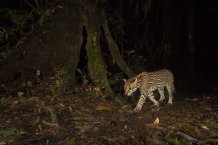Articles

The ocelot pictured in Peru (Credit: Christopher Beirne & British Ecological Society)
Stunning ocelot picture wins photography prize
A researcher overcame termites, mice, flash floods and camera malfunctions to win a nature photography award.
Christopher Beirne, of the University of Exeter and the Crees Foundation, set up a motion-activated camera to photograph a male ocelot walking a man-made trail in Peru.
The photograph has been chosen as the overall winner of the British Ecological Society’s annual photography competition, “Capturing Ecology”.
“This image came at the end of nearly 18 months living and working in the Peruvian Amazon with the Crees Foundation and the University of Exeter,” said Chris.
“The photograph was taken in a regenerating rainforest; an area of land which was completely cleared for agriculture 30-50 years ago.
“Documenting the wildlife that has returned as the forest has recovered was not only a real privilege, it has also changed my perspective on the value of degraded land in tropical areas – there is hope for the future!”
Although Chris was not present at the moment the image was taken, he had worked hard to set up the camera trap – and he was delighted with the result.
“It’s like setting up a photography studio in the forest, with a nice camera and several flashes,” he said.
“The camera triggers when an animal walks in front of a motion detector.
“Everything that could have gone wrong during that time did: equipment malfunctioned, animals knocked things over, termites and mice ate my cables, flash housings filled with water in huge storms.
“But all of the failures and frustrations disappear the second you turn on your camera to see an ocelot staring back at you.”
He added: “I particularly love nocturnal images – a frozen snapshot of a world that is usually hidden from view.”
Chris, who was based at the Centre for Ecology and Conservation at the University of Exeter’s Penryn Campus in Cornwall, has now completed his PhD research and is a postdoctoral researcher in tropical biology in the Poulsen Lab at Duke University in the US.
Speaking about the prize-winning picture, Dr Hazel Norman, Executive Director at the British Ecological Society, said: “Christopher’s image is a spectacular entry.
“He managed to capture an incredibly elusive and skittish wild cat which is primarily active during the night.
“Our judges had a difficult task to choose from many impressive entries this year.
“Some of the images demonstrated interactions between different species in their natural environment, which can be complex and difficult to capture.”
The winning images will be exhibited at ‘Ecology across Borders’, the Society’s annual meeting in Belgium later this month.
The independent judging panel included five eminent ecologists and award-winning wildlife photographers.
Date: 1 December 2017
